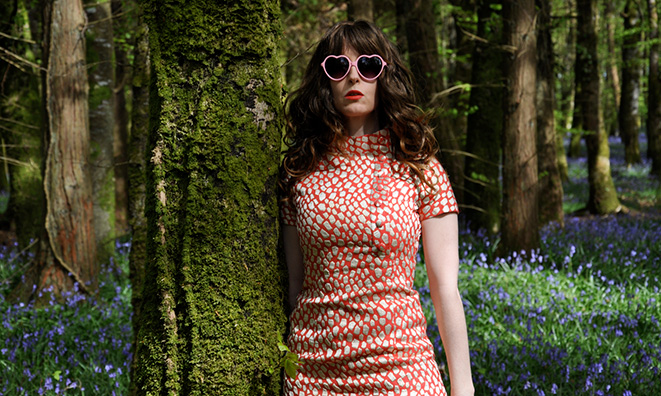Over the past 15 years Jennifer Walshe has become one of the most fêted composers in contemporary classical music. From writing an opera for Barbie dolls (XXX_LIVE_NUDE_GIRLS!!!) to creating a collective of fake Irish composers each played by Walshe herself (the Grúpat collective); from works for symphony orchestra and organ (Hotel Chelsea) to works for string quartet, voice and video (Everything is Important), Walshe’s artistic output is nothing if not multifaceted. Her art ignores false boundary lines and aims instead at creating new combinations of sound and vision appropriate to the world we live in today.
“Trying to be aware, trying to open my eyes, be aware of the world,” she says, “that’s done through the composition.” BASCA’s recognising her work with a British Composer Award for Innovation situates Walshe in the tradition of composers whose music begins by being categorised as avant-garde before its quality and freshness gains wider mainstream recognition.
Growing up, Walshe was surrounded by artistic inspiration. “My dad was the sort of father who would talk us through classical music,” she says, “and he was really into jazz. He was really into Bill Evans and John Coltrane. I learned to play jazz tunes because my dad would play guitar and I played trumpet.” Walshe’s talent on the trumpet led to her joining the brass section of the Irish Youth Orchestra, an experience that gave her a useful insight into the inner workings of some major works of the 20th century classical repertoire. “We did Mahler 2, Mahler 5, we did The Rite of Spring, we did Petrushka, we did Ein Heldenleben by Richard Strauss: we did massive pieces. When you’re a trumpet player and you sit in the back of the orchestra and you play Mahler and you play Stravinsky and you can see everything that’s happening because you’re in the back row – and I used to buy the scores and I’d watch and listen – that was massively impactful on me.”
Switching to composition
After trumpet studies at the Royal Scottish Academy of Music and Drama, Walshe switched to composition for her PhD at Northwestern University, Chicago. “I knew that I always wanted to make the stuff rather than just play it. But I went to a Conservatoire, and at that point nobody I knew went to a Conservatoire at 18 to do composition; you went doing an instrument and then you switched.” The environment at Northwestern, which saw Conservatoire students mix with people from departments such as film and sociology, fostered Walshe’s multimedia interests, and the music department fostered her experimentation. “Amnon Wolman was teaching there, Michael Pisaro was teaching there. So the approach that we had was very, very experimental, and you were sort of a satellite of Chicago, which itself has an amazing free improvisation scene.”
During her time in Chicago, Walshe also began to explore the voice, performing some of her own compositions and gaining experience as an improviser in the city’s jazz and improve scene. Her improvisation and vocal work emerged “very organically outside of the context of the Conservatoire,” she says. “We would get gigs playing support for people who were much bigger up the food chain, but they were really generous and supportive.” These formative influences – classical, jazz, improvisation and multimedia – are potently distilled in Walshe’s music.
Someway typical is THE TOTAL MOUNTAIN (2014) for voice, film and soundtrack, commissioned for the famous Donaueschingen festival in Germany. Performed by the composer herself in costume accompanied by onstage props, THE TOTAL MOUNTAIN sees Walshe vocalising into a microphone whilst behind her a video screen shows a sequence of surreal scenes: footage of Walshe dancing around a garden, a fake PowerPoint presentation, a fake TV advertisement for computer-programming-related pop songs, overblown musical renditions of tweets about Harry from One Direction, an eerie segment with people dressed in animal masks backed by Walshe making whispering sounds into the microphone, and so on. When I saw THE TOTAL MOUNTAIN performed in Dublin I was amazed at how a composition could at once be so strange and complex yet at the same time so immediate, relevant and relatable – a musical composition for the laptop generation, for those of us spending much of our day in front of a screen with five tabs open.
Walshe says THE TOTAL MOUNTAIN focuses on our use of the internet “almost in a Cubist way, coming at it from 50 different angles, trying to dig into it: loud angles, quiet angles, kitschy angles, austere angles”.
Experimental collaborations
Typically adventurous, too, is 13 Vices (2015), co-composed by Walshe and Northern Irishman Brian Irvine, a work for which Walshe and Irvine were recently nominated for a British Composer Award in the Chamber Music category.
13 Vices explores “the weird, funny, dark and exotic world of contemporary vices”; like THE TOTAL MOUNTAIN, it’s a work engaged with the world we’re living in today. “Brian Irvine and I had very clearly defined roles,” Walshe says of the collaboration. “There’s material that Brian wrote for string trio, material that he can shape and conduct. Then there’s a trio that come from free improv, some of them with a quite heavy jazz background. Then there’s me. I’ve made all the material from my voice, I’ve gathered all the texts together, Brian has done the string trio, and then he’s doing some conduction.”
Whilst joint authorship is almost the rule in popular music, it’s still quite rare in classical music. “I think it worked very well,” Walshe says, “but I don’t think those sort of collaborations work with everybody. You’ve just got to find the right people that it makes sense for you and that person.” One of the most intriguing elements of Walshe’s music is its theatrical or performative dimension. An important event in Walshe’s formative years was when she was taken to see a Samuel Beckett play. “In terms of live events that left a very lasting impact, one of the things that I remember most is my mum taking me to The Gate [Theatre] to see Waiting for Godot with Barry McGovern; I must have been 15 or 16 at the time.” This theatrical influence manifests in the abovementioned Grúpat, a fake collective of 12 musicians, all of them Walshe’s alter-egos, whose music Walshe has performed in concert and in costume. Grúpat’s members include Ukeoirn O’Connor, a composer with ethnomusicological leanings and a keen interest in linguistics; Turf Boon, who makes videos of ‘silent music’; and The Dowager Marchylove, dressed imperiously in Celtic noblewoman regalia.
Another recent manifestation of this theatrical dimension is Aisteach, a fake history of the Irish musical avant-garde for which project Walshe and her collaborators invented many different neglected Irish composers past, wrote their biographies, and then performed their music (much of it written by Walshe). In this way Walshe can also be seen as a working in the lineage of Irish authors like Samuel Beckett and Flann O’Brien.
As much has been recognised in her work being included in the forthcoming Dalkey Archive Anthology of Irish Literature, a book in which Walshe’s Aisteach will feature alongside prose by many of Ireland’s most famous authors. “A lot of my first creative endeavours were writing,” she says. “I wrote short stories and I won competitions when I was a kid and when I was a teenager. So for me to go back to writing and to be using text in my pieces a lot now, which is the case – that seems very natural and very normal.” A recent work treading the line between theatre and music is the string quartet Everything Is Important (2016), composed for the Arditti Quartet accompanied by Walshe and premiered to acclaim at the Darmstadt Summer Courses for New Music. Much of the text is taken from “weird Twitter”, Walshe says, and other internet sources. “Text is super important to me at the moment, because I consider text almost like the canary in the coal mine. It’s like an early warning system of how culture is changing.”
When asked about the British Composer Award for innovation, Walshe points out that the main thing for her is simply writing what feels relevant and real. “I love experimental music and art. I don’t know if I had an early exposure that sort of sent me on that course but I’ve always loved that. And so, you don’t think, Is this being innovative? You’re just thinking, Does this speak to me? Is it vibrant? Is it alive? Does it have a certain quality of energy which, to me, seems to be trying to forge something new? I don’t mean newness for the new’s sake, but I just mean, we’re in this world, it’s so unique, it’s so bizarre the world that we’re living in. I don’t want to just use the same old language to describe it, whether that’s sonic or textual.”
The BASCA award has particular resonance for her, too, she says in closing, given the current social and political climate in the UK. “I think it’s a beautiful statement, given Brexit and given the nationalism that we see rampant in the world today, that I am an Irish composer living in the UK and I get a British composer award. I think that says a lot about the plurality and the vision that BASCA has for music.”
To find out more about Jennifer Walshe, see: www.milker.org
Article first featured in The Works [2016]





